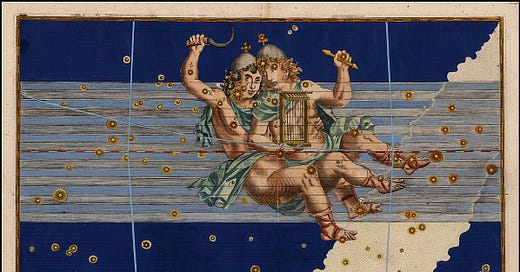In Book V of The City of God, St. Augustine of Hippo offers an interesting and powerful critique of the practice of astrology, one that builds on the earlier critique provided by the Greek statesman Cicero in his De Divinatione. Astrology was widely practiced throughout the late Roman empire, and in particular was a central part of the Manichaean religious movement to which Augustine had belonged prior to his re-conversion to Catholicism. Augustine, therefore, had some personal experience with astrology and deeply personal reasons for wanting to refute the practice. In The City of God, though, Augustine’s stated purpose is to respond to the claim that the greatness of the Roman empire was a matter of fate, determined by the stars.
Augustine asks his readers to consider the case of twins, conceived and born at the same time. According to the astrologers, these twins, having been born under the same stars, should have very similar, if not identical lives. In reality, although twins often have much in common such as their upbringing, health, and social condition, more likely than not they will live very different lives, perhaps entering different professional fields, achieving differing levels of success, and developing different relationships. These differences would be inexplicable if astrology had any factual basis.
Roman astrologers responded to this argument by pointing out that even twins are born at different times, minutes apart or even longer; therefore, the patterns in the stars when they are born are slightly different, which accounts for the differences in their subsequent fates. Augustine has two particularly clever rejoinders to this. First, he responds to an astrologer named Nigidius who argued that, because the heavenly spheres rotate at such a great velocity, even the small difference in time between the births of two twins can lead to quite different arrangements of the stars, even if those differences are imperceptible to astrologers. Augustine counters that, if the motions in the stars can be imperceptible to astrologers and yet be significant enough to have an impact on the lives of twins, then why wouldn’t the same be true for people who are not twins? How can astrologers say anything with confidence about the fates of anyone? Second, Augustine points out that, even if twins are born at slightly different times, they (or at least those we today would call identical twins) are conceived at the same time, and yet their destinies already begin to part early on, as exhibited by the very fact that they are born at slightly different times!
Augustine writes that, even though he criticizes the astrologers as a Christian, his criticisms should be of value to pagans, as well: “For what does this opinion really amount to but this, that no god whatever is to be worshipped or prayed to?” The claims of the astrologers call into question our free will and responsibility for our actions.
Keep reading with a 7-day free trial
Subscribe to Window Light to keep reading this post and get 7 days of free access to the full post archives.




